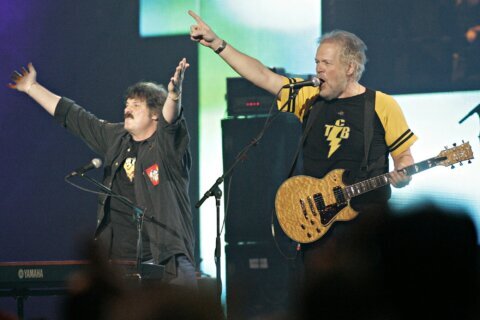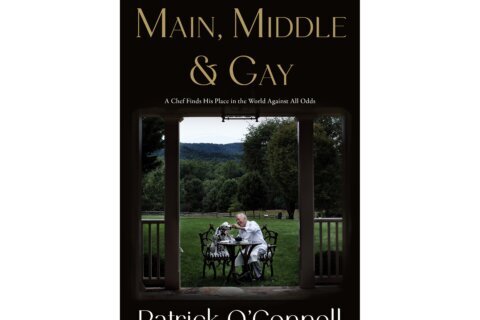This video is no longer available.
Hear our full chat on my podcast “Beyond the Fame with Jason Fraley.”
The third annual Let’s Go! Music Festival returns to Annapolis, Maryland, this weekend, including Live and Collective Soul on Friday; 311, Cold War Kids and Lit on Saturday, and Chris Young and Kip Moore on Sunday.
WTOP caught up with Collective Soul co-founder and rhythm guitarist Dean Roland for a preview.
“The most fun part about playing these types of festivals is, normally, we are out on the road doing our own shows, but when you do these festivals you get to see your buddies that you haven’t seen in a while, like the guys from Live or Lit … that’s one of the perks,” Roland told WTOP. “Come see us, come hang out, we’ll have a lot of fun.”
Born and raised in Stockbridge, Georgia, located about 20 miles south of Atlanta, Dean and his brother Ed grew up in a musical family, so it was pretty much a foregone conclusion that they would pursue music.
“Our father was a voice major in college and went on to be like a minister of music when he became a Southern Baptist preacher, so music was always in our house, our mother played piano in church,” Roland said. “We were surrounded by music. I didn’t really see it as an option, it was just part of the colors of the wall. It was my life. As far as influences of music, I’m a product of the early ’80s, so INXS, U2, The Police, The Cure.”
In 1992, the brothers formed Collective Soul with Ed on lead vocals, Dean on rhythm guitar, their neighbor Will Turpin on bass, Shane Evans on drums and Ross Childress on guitar.
“We went to high school together,” Roland said. “I’ve known Will literally as long as I’ve known anything. He grew up four blocks down the street and his wife grew up literally across the street, so it was just a small-town vibe. Will’s father was a musician and he owned a small recording studio called Reel to Reel, so our dad was the church music dude and his dad was the rock ‘n roll music dude, so we kind of married those two things.”
The band’s first album “Hints, Allegations and Things Left Unsaid” (1993) was released on the independent label Rising Storm and caught the attention of the college radio station WRAS/Album 88 at Georgia State University.
“Half were Ed demos that he did by himself, ‘Shine’ being one,” Roland said. “Album 88 is one of the better college rock stations in the country, if not the best. I literally went and knocked on the door, the door swung open and I said, ‘Hey, do you mind checking us out?’ … The dude listened to it and he liked ‘Shine.’ He played it and it was like the old-school days, a lot of people called in, he contacted us and he later became a co-manager of our band.”
The album was re-released by Atlantic Records and went double platinum thanks to the smash hit “Shine,” ranked No. 42 on VH1’s 100 Greatest Songs of the ’90s. The song’s iconic refrain of “heaven let your light shine down” transcended rock radio to pull in Christian-rock fans and was later covered by Dolly Parton on her bluegrass album “Little Sparrow” (2001), winning the Grammy for Best Female Country Vocal Performance.
“That was a really huge honor, especially for Ed, a song that he wrote, for a songwriter of Dolly’s stature, for her to cover one of your songs, that’s a big deal,” Roland said. “You make the music that’s part of your environment. We’ve always been honest with ourselves and those are the words that we grew up with. As a kid, we were in church three times a week, forced to read the Bible, so that becomes a part of your verbiage, your language.”
Their second album “Collective Soul” (1995), also known as “The Blue Album,” included the contemplative hit “The World I Know,” which remains one of the best songs of the era with the chorus: “So I walk up on high, and I step to the edge, to see my world below. And I laugh at myself, while the tears roll down, ’cause it’s the world I know.”
“We were in New York City and Ed wrote those lyrics almost autobiographically,” Roland said. “You’re getting it from different directions with people trying to put you in a box and define what you are. Are you a Christian band? At that time, grunge was in its heyday … we were being criticized for being grunge-lite, so we were having to take all these shots like, ‘Wait, we just want to play music’ … Ed was in a self-reflective place: ‘Wow, this is what it is?'”
That same album featured another hit single, “December,” which chronicled the band’s struggle with its first manager, featuring the lyric: “Don’t scream about, don’t think aloud, turn your head now baby just spit me out.”
“It’s just a metaphor for being a disposable product for someone,” Roland said. “A lot of people take it as a sexual innuendo, but I think it’s a metaphor for being just another disposable product for somebody. You’re doing all you can to participate and play your role, but the other person is just not holding up their end of the bargain.”
Their third album “Disciplined Breakdown” (1997) featured “Precious Declaration” and “Listen,” both of which topped the Mainstream Rock Chart, but didn’t cross over to the mainstream pop charts like the previous albums.
“The challenge was that we had ended the managerial relationship, so we were stuck in a lawsuit with that situation, all our finances were frozen and waiting for that stuff to be worked out, so that’s when we went and basically locked ourselves in a log cabin and recorded a record there,” Roland said. “I think that lyrically and musically it’s a littler darker record — and I think that just represents where we were at the time.”
Eight more albums have followed: “Dosage” (1999), “Blender” (2000), “Youth” (2004), “Afterwords” (2007), “Collective Soul” (2009), “See What You Started by Continuing” (2015), “Blood” (2019) and their newest album “Vibrating” (2022), featuring the new singles “All Our Pieces” and “Cut the Cord.”
“These last two or three records, ‘See What You Started,’ ‘Blood,’ ‘Vibrating,’ have been some of the most fun records to record,” Roland said. “A lot of it is us going back to our roots, like the way we recorded it and just knowing what our strengths are and having fun with that again, playing rock riffs and just trying to find some good honest lyrics with a nice melody on top … we decided to go back to recording the way that we did early on.”
Hear our full chat on my podcast “Beyond the Fame with Jason Fraley.”








